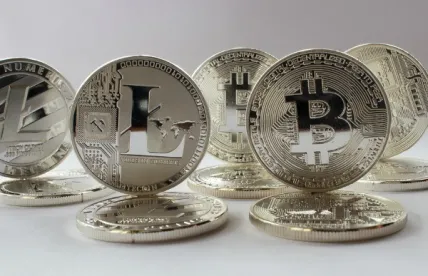On August 6, 2021, the Securities and Exchange Commission (SEC) announced that it had charged two men, Gregory Keough and Derek Acree, and their company, Blockchain Credit Partners, doing business as DeFi Money Market (collectively, the “Respondents”), for unregistered sales of more than $30 million of securities using smart contracts and so-called “decentralized finance” (DeFi) technology and for making false and misleading statements about their business to investors in violation of the federal securities laws. (In re Blockchain Credit Partners, No. 3-20453 (SEC Order Aug. 6, 2021)).
In recent days, many eyeballs were closely watching the drama behind the cryptocurrency taxation and transparency measures contained in the Senate’s infrastructure bill and are still digesting SEC Chair Gary Gensler’s recent remarks before the Aspen Security Forum that offered some clues on where the agency will go with respect to cryptocurrency regulation and enforcement. Meanwhile, the SEC continued its enforcement efforts to shut down what it deems fraudulent and unregistered securities offerings involving digital assets. After ceasing operations in February 2021, Respondents consented to a cease-and-desist order that includes disgorgement totaling almost $13 million and civil penalties of $125,000 each of the individual Respondents. The SEC’s order provides another example of how the now-familiar investment contract analysis applies to tokens, with some additional insights on the impact of voting rights under the Howey test and a further analysis of tokens as notes.
According to the SEC’s order, the Respondents offered and sold unregistered securities through their company DeFi Money Market (“DMM”), from February 2020 to February 2021. The Respondents sold two types of digital tokens: mTokens (which could be purchased by transferring digital assets to DMM’s address on the Ethereum blockchain in exchange for the mTokens that paid interest to investors) and DMG “governance tokens” (which purportedly gave holders certain voting rights, a share of excess profits, and the ability to resell DMGs on the secondary market). Respondents claimed they would use the investments to purchase “real world” assets (e.g., auto loans) that would generate income sufficient to provide a guaranteed stable return. These representations, were repeated on DMM’s website and on social media.
The SEC claimed that the mTokens were securities because they were notes under the Reves analysis (based on the 1990 Reves Supreme Court decision), stating among other things that proceeds from the mTokens were used to fund the business, purchasers bought mTokens solely to earn 6.25% interest on their digital assets, and there was no alternative regulatory scheme governing the mTokens. Moreover, the SEC asserted that the mTokens were offered and sold as investment contracts under the Howey test because purchasers had a reasonable expectation of obtaining future profit from Respondents’ efforts in pooling mToken proceeds to buy assets that would generate income sufficient to pay 6.25% interest upon redemption.
Similarly, the SEC alleged that the DMG tokens were also securities under the Howey test because Respondents created a reasonable expectation of profits derived from Respondent’s essential efforts managing the DMM business and creating a trading market for DMG tokens. Notably, although holders of the DMG tokens had the right to vote on some aspects of DMG’s business – such as the digital assets that DMM would accept from investors – the SEC’s order indicates that such voting rights were not inconsistent with the “efforts of others” element of the Howey and did not preclude the token from being a security. The SEC stressed that labels like “governance token” are not determinative and that precedent dictates that the issue of whether a digital token is a security requires an assessment of “the economic realities underlying a transaction.”
The SEC’s fraud charges related to Respondent’s conduct during their offers and sales of mTokens and DMG tokens. While the SEC has brought actions and shut down fraudulent ICOs and similar offerings because they were a complete sham, in this case the DMM hired programmers to write smart contracts on the Ethereum blockchain and develop code that created the digital tokens offered for sale and a protocol that allowed DMG holders to vote. Still, the SEC’s order outlines a number of false and misleading statements by Respondents about how DMM operated, such as statements that DMM’s assets backing mTokens included car loans exceeding $8.9 million, when in fact the loans were owned by a different company for which DMM’s principals served as executive officers, and statements that the Respondents personally funded payments to redeem mTokens to make it appear that DMM assets generated interest.
This latest enforcement action was labeled by the agency as its “first involving securities using DeFI technology” (even if the operations of DMM was really only DeFi Lite), and it signals the agency’s willingness to police the latest types of cryptocurrency token offerings. SEC Chair Gensler, in his Aspen Security Forum remarks, stressed that there is not enough investor protection in crypto and that, in his opinion, “we have a crypto market now where many tokens may be unregistered securities, without required disclosures or market oversight.” With developments coming in cryptocurrency regulation, enforcement, legislation, as well as evolution in the underlying technology and market, we will be watching closely.



 />i
/>i